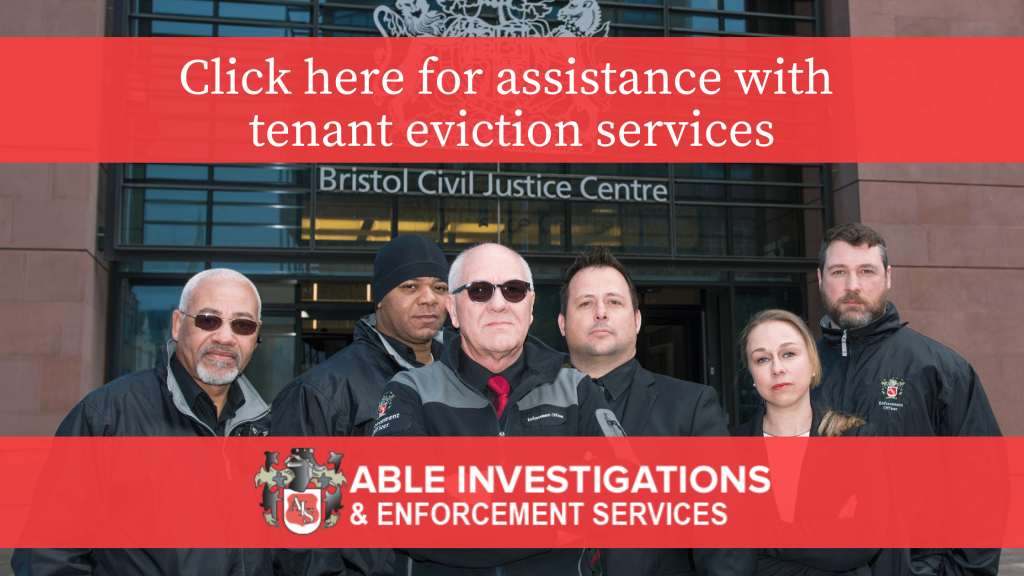Do you need urgent assistance evicting a problematic tenant from your London property?
As specialist eviction experts with over 20 years of experience, we can provide comprehensive support to remove disruptive, non-paying, or damaging tenants through the legal eviction process.
Contact Us For Evicting Your Tenant
Expert Tenant Evictions from Able Investigations
Our end-to-end eviction service includes:
- Initial consultation to review your situation and determine if grounds for eviction exist under Section 8 or Section 21 of the Housing Act 1988. We’ll advise the best approach based on the circumstances (along with upcoming renters reform legislation)
- Drafting and serving the appropriate legal notice to the tenant per the Act. This is the first step in initiating the eviction process. Our team will handle notice preparation and delivery.
- Filing for possession proceedings at the court if the tenant does not vacate after receiving notice. We’ll assist with all required paperwork and filings.
- Applying for a warrant of possession if they still won’t leave after the order.
- Conducting the eviction itself, including supervision of licensed enforcement agents and security personnel to ensure it is done safely, legally and with discretion.
Why Choose Able for Tenant Evictions in London?
Problematic tenants can seriously impact your finances and property. Our specialised knowledge helps expedite tenant evictions in London:
- We know how to thoroughly document the grounds for eviction to satisfy court requirements, whether it’s rental arrears, lease violations, antisocial behavior or other issues.
- Our licensed enforcement agents are specially trained to carry out swift and lawful evictions in compliance with regulations. We coordinate security for a smooth process.
- For rental arrears cases, we can provide continuous updates on the status of owed payments, working in tandem with the eviction process.

Don’t wait to take action if you have an unruly, non-paying tenant. The longer they remain in the property, the more hardship they can cause through:
- Accumulating rental income losses from non-payment
- Increased legal costs the longer the case drags on
- Potential property damage if the tenant stops caring for the unit
- Disruption and liability from anti-social or criminal behavior on the premises
Get in touch today to schedule a consultation. Our priority is minimising disruption and cost for landlords dealing with bad tenants in London.
With many years of experience in landlord tenant evictions in the city, we have handled hundreds of difficult cases across boroughs. Our wealth of experience with London courts, judges and enforcement procedures delivers proven results.
Whether it’s a single rental unit or large multi-property portfolio, we have worked with landlords of all sizes to resolve their tenant issues. Contact us to learn more and get started on legally removing your problem tenant.
FAQs
Does it make a difference if I use a section 8 notice or a section 21 notice for an eviction?
Section 8 evictions allow landlords to evict tenants who have breached the terms of their tenancy agreement, such as by not paying rent or damaging the property. The landlord must serve notice detailing the breach and allow time to rectify it. If unresolved, the landlord can apply to court for a possession order, requiring proof of the breach. Grounds include rent arrears, property damage, antisocial behaviour, false tenancy application statements, etc.
Section 21 evictions are “no-fault” evictions allowing landlords to regain possession without specifying a reason, at the end of a fixed term. The landlord simply serves 2 months’ notice of their intent to terminate the tenancy. No court process is needed as long as legal requirements are met, like deposit protection and gas safety certificates. Section 21 cannot be used in the first 4 months.
Section 21 evictions are set to be abolished as part of the renters reform legislation. Learn more about this here.
Do different types of tenancies mean different rules around eviction?
Yes, the type of tenancy agreement can impact the rules and process around eviction in the UK. Here’s a quick summary:
- Assured Shorthold Tenancies (ASTs) – The most common type of residential tenancy. Section 21 and Section 8 eviction rules outlined above apply to ASTs after the fixed term ends and it becomes a statutory periodic tenancy.
- Fixed Term Tenancies – Section 21 cannot be used to evict during the fixed term unless there is a break clause. Section 8 can still be used if the tenant breaches the agreement. At term end, tenancy expires and no eviction process needed.
- Regulated Tenancies – Rare type with very high legal protections from eviction. Cannot use Section 21 or Section 8 unless serious breaches. Regaining possession is difficult.
- Licenses – Not strictly tenancies so standard eviction rules don’t apply. Short notice periods only, though licensors must follow lawful processes.

